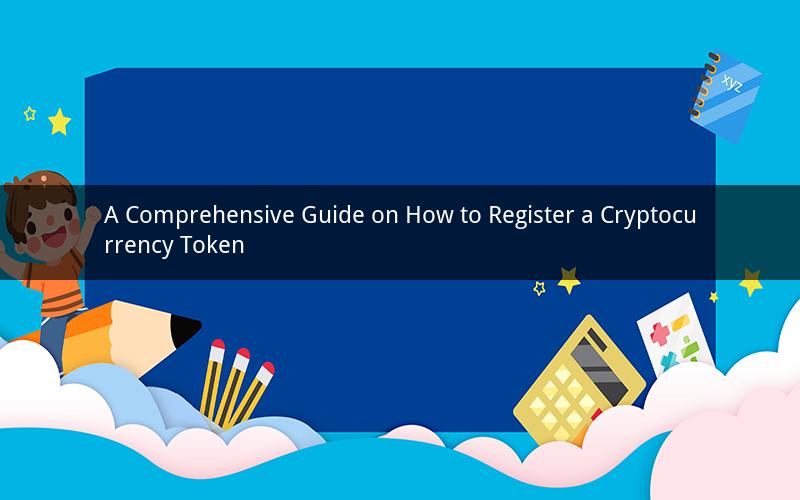
Introduction:
The cryptocurrency market has experienced exponential growth over the years, attracting investors from all around the world. As a result, the demand for registering cryptocurrency tokens has surged. This article aims to provide a detailed guide on how to register a cryptocurrency token, ensuring compliance with regulatory requirements and enhancing the token's credibility.
1. Understanding Cryptocurrency Tokens:
Before delving into the registration process, it is crucial to have a clear understanding of what a cryptocurrency token is. A token is a digital asset built on a blockchain platform, representing a unit of value or a specific utility within a decentralized ecosystem. Unlike cryptocurrencies like Bitcoin and Ethereum, tokens are designed to serve specific purposes, such as rewarding users, accessing services, or representing ownership in a project.
2. Identifying the Purpose of the Token:
The first step in registering a cryptocurrency token is to identify its purpose. This will help determine the appropriate regulatory framework and compliance requirements. Common purposes of tokens include:
- Utility Tokens: These tokens provide access to a specific service or product within a decentralized platform.
- Security Tokens: These tokens represent ownership or equity in a company and are subject to stricter regulatory requirements.
- Payment Tokens: These tokens are used as a medium of exchange, similar to cryptocurrencies like Bitcoin.
3. Conducting a Token Sale:
Once the purpose of the token is established, the next step is to conduct a token sale. This involves raising funds by selling the tokens to investors. Here are the key aspects to consider:
- Whitepaper: A comprehensive whitepaper should be developed, outlining the project's goals, technology, tokenomics, and regulatory compliance. This document serves as a roadmap for potential investors.
- Legal Compliance: Ensure that the token sale complies with applicable securities laws and regulations. This may involve registering with securities regulators or conducting a private placement.
- Marketing and Promotion: Develop a marketing strategy to attract investors. Utilize social media, partnerships, and networking events to increase awareness and generate interest in the token.
4. Token Creation and Distribution:
After successfully conducting a token sale, the next step is to create and distribute the tokens. This process involves:
- Blockchain Platform: Choose a suitable blockchain platform to host the token. Ethereum is the most popular platform due to its extensive ecosystem and developer community.
- Smart Contract Development: Develop a smart contract that governs the distribution, transfer, and functionality of the token. It is crucial to ensure the smart contract is secure and free from vulnerabilities.
- Token Distribution: Distribute the tokens to investors and stakeholders. This may involve transferring tokens to their respective wallets or exchanges.
5. Compliance and Legal Considerations:
Registering a cryptocurrency token involves various compliance and legal considerations. Here are some key aspects to keep in mind:
- Know Your Customer (KYC) and Anti-Money Laundering (AML): Implement KYC and AML procedures to verify the identity of investors and prevent money laundering activities.
- Regulatory Compliance: Stay updated with the regulatory landscape in the jurisdictions where the token is offered. This may involve registering with financial authorities, obtaining licenses, or adhering to specific reporting requirements.
- Intellectual Property Protection: Secure intellectual property rights related to the token, including trademarks, patents, and copyrights.
6. Post-Registration Activities:
Once the token is registered, there are several post-registration activities to consider:
- Token Listing: List the token on reputable exchanges to enhance liquidity and accessibility for investors.
- Community Engagement: Build and engage with a strong community of users, developers, and investors. This can be achieved through social media, forums, and events.
- Continuous Development: Continuously improve the token's functionality, security, and user experience to ensure its long-term viability.
Frequently Asked Questions:
1. What is the difference between a cryptocurrency and a cryptocurrency token?
A cryptocurrency is a digital or virtual currency that uses cryptography for security. Tokens, on the other hand, are digital assets built on a blockchain platform, representing a unit of value or utility within a specific ecosystem.
2. Why is it important to register a cryptocurrency token?
Registering a token ensures compliance with regulatory requirements, enhances its credibility, and provides legal protection to both the token issuer and investors.
3. Can I register a cryptocurrency token without conducting a token sale?
Yes, it is possible to register a token without conducting a token sale. However, it is important to consider alternative funding methods, such as private investments or partnerships.
4. How long does it take to register a cryptocurrency token?
The time required to register a token varies depending on the jurisdiction and the complexity of the project. It can take anywhere from a few months to a year or more.
5. What are the risks associated with registering a cryptocurrency token?
The risks include regulatory scrutiny, legal challenges, security vulnerabilities, and market volatility. It is crucial to conduct thorough due diligence and seek professional advice to mitigate these risks.
Conclusion:
Registering a cryptocurrency token is a complex process that requires careful planning and consideration of various factors. By understanding the purpose of the token, conducting a token sale, ensuring compliance with legal and regulatory requirements, and engaging with the community, you can successfully register a token and contribute to the growth of the cryptocurrency ecosystem.